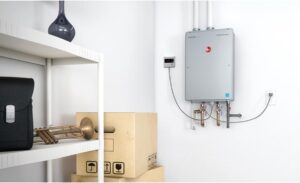Benefits of Tankless Water Heaters vs. Tank Water Heaters
When you picture a water heater, a cylindrical tank holding 30 to 60 gallons of hot water probably comes to mind. But tankless models the size of a carry-on suitcase are another option. Which one is right for your family’s needs and budget? Learn how each system works and compare the benefits of storage tanks vs. tankless water heaters to help you decide.

How Does a Storage Tank Water Heater Work?
Storage tank water heaters are the traditional method for heating hot water. Cold water flows into the top of the tank and is heated by a natural gas burner, electric element, or another fuel source. The tank holds water at 120 to 140 degrees F, so it’s ready when you need it.
How Does Tankless Water Heating Work?
As the name suggests, tankless water heaters don’t store hot water in a tank. Instead, the unit instantly brings cold water up to temperature. For this reason, tankless units are also called instantaneous or on-demand water heaters.
Tankless Water Heaters vs. Storage Tank Water Heaters
Both methods of heating water may be suitable for different situations. Here’s how they stack up.
Purchase Price & Installation Complexity
Electric tank-style water heaters are the least costly to purchase and install, while gas-powered tankless water heaters are the most expensive. Part of the upfront price is due to the complexity of installing tankless water heaters. Gas models, in particular, may call for ventilation and power modifications.
Winner: Tank water heater
Energy Efficiency
The biggest reason to go tankless is to enjoy lower water heating bills. By supplying hot water on demand rather than keeping water hot 24/7, tankless models experience no standby heat loss. As a result, tankless water heating can cut your bill in half.
Winner: Tankless water heater
Performance
Which is more important to you—high flow rate or back-to-back showers?
If you want the option to shower while the dishwasher is running, tank water heaters are your best bet. These appliances supply 7.5 to 9.5 gallons per minute (gpm) to facilitate multiple hot-water tasks. On the other hand, tankless hot water heaters only deliver 2.5 to 5 gpm, limiting you to one or two hot water activities at once.
If endless hot water is a priority, tankless water heaters are the way to go. While conventional tanks take 20 to 60 minutes to reheat after depleting the hot water supply, tankless units have no reheating time because they work on-demand. This means your family can take back-to-back showers and never run out of hot water.
Winner: Tie
Temperature Consistency
Tank water heaters are praised for their consistent temperatures. As long as the appliance is functioning correctly, you can expect a steady hot water supply from every tap.
Tankless water heaters struggle more with this. Because the flow rate is lower, you can tell if someone starts the dishwasher or washing machine while you’re in the shower. Tankless models also suffer from the “cold-water sandwich,” which turns the water cold if you shut it off for more than a few seconds or decrease the flow to a trickle. And despite being called “instantaneous,” tankless units do not provide “instant” hot water. The unit takes a moment to begin generating hot water, so it takes several seconds longer to arrive at the tap.
Winner: Tank water heater
Lifespan & Warranty
The average storage tank lasts eight to 12 years, while tankless water heaters can easily last 20 years or more. Manufacturers know this, so many offer more generous warranties on tankless products.
Winner: Tankless water heater
Equipment Size
If you don’t have much room to spare, a small tankless water heater is a welcome upgrade. Instead of having a bulky tank occupy precious space in your utility closet, a compact tankless unit mounts inconspicuously to the wall. This reduced size also makes point-of-use water heaters possible under kitchen and bathroom sinks and above the washing machine.
Winner: Tankless water heater
Operation During a Power Outage
Because tanks keep hot water at the ready, you can usually get one shower out of it during a power outage. This is not the case with a tankless unit, which needs electricity to operate, even if it runs primarily on natural gas.
Winner: Tank water heater
Safety
Storage water heaters can expose your family to harmful mineral buildup. They can also cause significant water damage if the shell rusts through. The tank could even explode if the temperature and pressure relief valve malfunctions. Tankless water heaters don’t pose these risks.
Winner: Tankless water heater
Schedule Water Heater Services in Houston
Whether you want to install a tank-style water heater or a tankless model, Redfin Plumbing can help. We offer exceptional quality services and warranty coverage for your peace of mind. Our team can also perform any water heater repairs and maintenance you need over the years. We guarantee your 100% satisfaction, so call with confidence! Reach out at 281-870-2373 or contact us online today to schedule water heater services in the Greater Houston Area. We proudly service Houston, Cypress, Katy, Sugarland, Pearland, the Woodlands, Kingwood, and the surrounding Greater Houston area.
